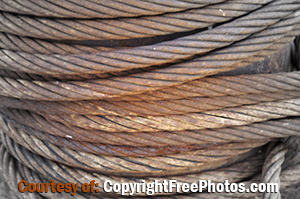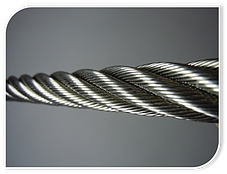Good Afternoon All! Here at the HotWire, we field numerous questions about Corrosion Resistance when it comes to wire and cable. We've been asked everything from "What exactly is Corrosion Resistance?" to "What are the benefits and drawbacks?" Today, we plan on clearing this up by starting with the basics.
 What is Corrosion? Corrosion is a gradual degradation of materials (steels in our case) that naturally occurs due to chemical reactions within its environment. Naturally, atmospheric oxygen will slowly corrode materials and additional environmental catalysts will actually speed up this process. Saltwater is a very common catalyst and that is why steel corrodes more quickly near the ocean than it would inland. Saltwater isn't the only factor that can speed up the corrosion process - you'll find that most environmental extremes and chemicals factor in.
What is Corrosion? Corrosion is a gradual degradation of materials (steels in our case) that naturally occurs due to chemical reactions within its environment. Naturally, atmospheric oxygen will slowly corrode materials and additional environmental catalysts will actually speed up this process. Saltwater is a very common catalyst and that is why steel corrodes more quickly near the ocean than it would inland. Saltwater isn't the only factor that can speed up the corrosion process - you'll find that most environmental extremes and chemicals factor in.
So why is Corrosion bad? Doesn't rust make metal stronger? Yes, initial rusting can make a metal stronger - but this is only for a very short time. The rust will fill in gaps and valleys in a rope/cable and give it added strength. However, the corrosion will eventually spread well into the steel and greatly diminish the breaking strength.
How can we prevent corrosion? Well, there are many ways to prevent corrosion. Galvanization is the most basic of corrosion resistance. This process involves hot-dipping carbon steel into zinc. This zinc coating acts as a barrier to the rust and slows down the corrosion process. Today, you'll find that most steels used in just about anything are galvanized. Often times though, galvanization just isn't going to cut it. Stainless Steel obtains its corrosion resistance due to two elements - Nickel and Chromium. Pure nickel has chemical properties that make it a natural corrosion resistant material. Stainless alloys are comprised of more than just nickel though, and what you'll find is the higher the Nickel content, the higher the corrosion resistance. There is one trade off though - the higher the nickel, the lower the strength. This is why you'll find numerous grades of stainless steel, all of which have different amounts of nickel to find an intricate balance between strength and corrosion resistance. As for the Chromium content, what that does is the coolest part. When Chromium is exposed to oxygen, it creates a thin passivation layer over the stainless steel that is impervious to air and water - preventing the potential corrosion of everything below it. But that isn't where it ends. If the surface is scratched, this layer quickly reforms to recreate that passivation layer.
 So what does this mean for Wire, Cable, & Wire Rope? Every product application is different, and that will be used to determine the best product for your need. If your application sees the cable or wire being subject to harsh weather conditions near the ocean - you'll probably be interested in stainless steel. If you are using cable for fitness machines in a gym, that lubricated galvanized cable will work great. Maybe you are using lashing wire that is exposed to the weather? Stainless 302/304 may work fine, but you could also use Stainless 316 which will last even longer. The fact of the matter is that each application is different, and you'll have to weigh all of the pros and cons. There is a direct correlation between level of corrosion resistance and cost and an inverse relationship between corrosion resistance and strength. So be sure to keep these all in mind as you choose your next alloy.
So what does this mean for Wire, Cable, & Wire Rope? Every product application is different, and that will be used to determine the best product for your need. If your application sees the cable or wire being subject to harsh weather conditions near the ocean - you'll probably be interested in stainless steel. If you are using cable for fitness machines in a gym, that lubricated galvanized cable will work great. Maybe you are using lashing wire that is exposed to the weather? Stainless 302/304 may work fine, but you could also use Stainless 316 which will last even longer. The fact of the matter is that each application is different, and you'll have to weigh all of the pros and cons. There is a direct correlation between level of corrosion resistance and cost and an inverse relationship between corrosion resistance and strength. So be sure to keep these all in mind as you choose your next alloy.
Well, we hope this answers any questions you may have about corrosion resistance. As always though, if you are struggling with your application, and trying to determine how much corrosion resistance you may need, feel free to Contact a Product Manager and they will help you out. And as always, if you have any questions at all, please Email Us and we will do everything in our power to assist.



